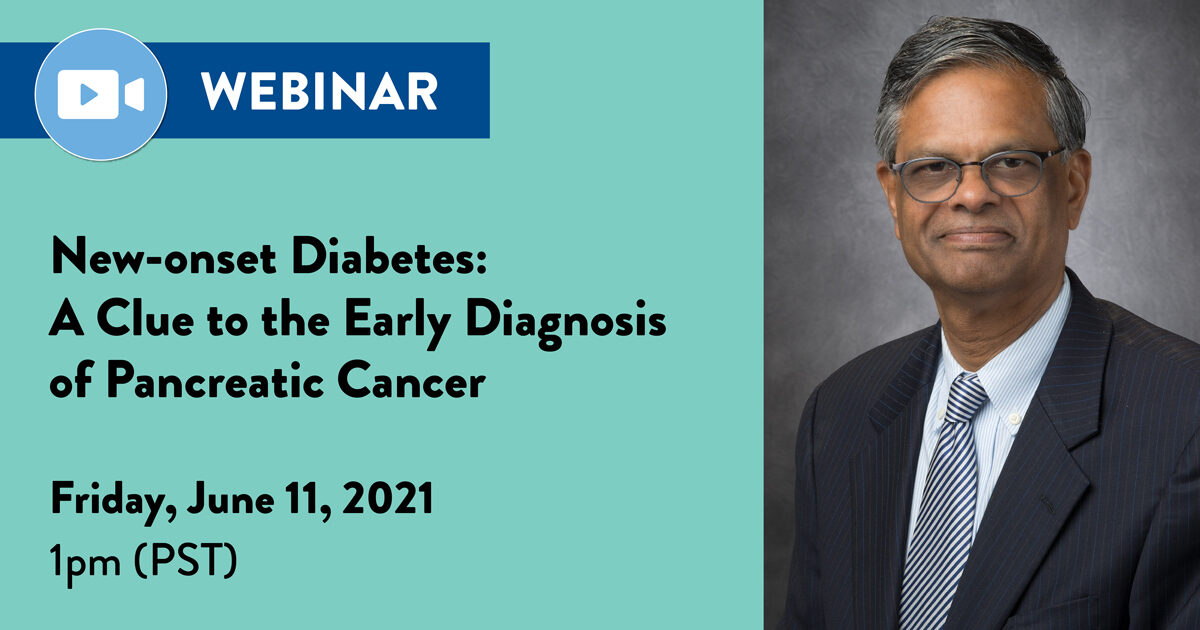Dr. Suresh T. Chari, Professor of Medicine with The University of Texas MD Anderson Cancer Center and Fellow of the American College of Gastroenterology (FACG), will join our Patient and Family Webinar Series to discuss pancreatic cancer and new-onset diabetes. Suresh T. Chari, MD, will address the history of the link between diabetes and pancreatic cancer and the newest advances taking place to use diabetes as an early detection tool.
The relationship between diabetes mellitus, commonly known as type 2 diabetes, and pancreatic cancer has been known for over 150 years, yet it is still not fully understood. Diabetes is a disease that occurs when blood sugar, or blood glucose, levels are too high. Insulin, a key hormone produced by the pancreas, helps regulate blood sugar levels by carrying sugar into cells and lowering the amount of sugar in the bloodstream. In prediabetes and diabetes mellitus (type 2), cells become resistant to insulin and the pancreas is unable to produce enough insulin to compensate for the insulin resistance. Rather than being transported into the cells where it is needed for energy, sugar builds up in the bloodstream.
The complex relationship between type 2 diabetes and pancreatic cancer has been the subject of numerous studies. These studies suggest that long-standing type 2 diabetes is a modest risk factor for the development of pancreatic cancer. Studies show that the risk of pancreatic cancer in those with long-standing diabetes, defined as longer than 3 years, is 1.5 to 2.0 fold higher. This is not fully explained by shared risk factors between the two diseases such as obesity.
Conversely, patients with new-onset diabetes over the age of 50, have an 8-fold higher risk for having pancreatic cancer. In these instances, it is believed that the tumor in the pancreas is what caused the diabetes. It appears that pancreatic cancer prevents the insulin-producing cells of the pancreas (islet cells) from adequately responding to insulin resistance. Thus new-onset diabetes may be a clue to the early diagnosis of pancreas cancer. However, the success of the strategy to use new-onset diabetes as a marker of pancreatic cancer will depend on the ability to distinguish pancreatic cancer-associated diabetes from the more common type 2 diabetes. This strategy helps provide a diagnosis for early, asymptomatic pancreatic cancer.
There is also strong evidence to show that pancreatic cancer causes diabetes. Hyperglycemia and diabetes mellitus occur in ~85% of pancreatic cancer subjects, with diabetes being present in 45% to 67% of pancreatic cancer patients, depending on how diabetes is ascertained. The majority (~75%) of diabetes in pancreatic cancer is new-onset, meaning the patient has had diabetes for less than 3 years. The new-onset diabetes often resolves with resection of the cancer through surgery. New-onset diabetes appears to be the only clue to the presence of asymptomatic sporadic pancreatic cancer. Nearly 25% of patients with pancreatic cancer are diagnosed with diabetes 6 months to 36 months before the diagnosis of pancreatic cancer.
Recently, the Enriching New-onset Diabetes for Pancreatic Cancer (ENDPAC) score has been proposed and validated as a way to identify a subgroup of new-onset diabetes subjects at very high risk for having pancreatic cancer. This score is based on three factors 1) age, 2) amount of weight lost and 3) rise in blood glucose in the year before new-onset diabetes. An NIH study is now enrolling 10,000 subjects with new-onset diabetes and will perform CT scans on the subgroup of new-onset diabetes patients with high ENDPAC scores.
It has taken nearly 200 years since the first observation that diabetes occurs in pancreatic ductal adenocarcinoma (PDAC) patients to use this correlation as a diagnostic tool. We are now close to using this observation to detect pancreatic cancer early.
Suresh T. Chari, M.D. is a Professor of Medicine with The University of Texas MD Anderson Cancer Center. Dr. Chari is a gastroenterologist clinician-investigator with an interest in pancreatic diseases. From 1999 through 2019, he was a faculty member at Mayo Clinic, Rochester. He led Mayo’s Pancreas Interest Group and was Director of the Pancreas Clinic, the primary entry point for all patients with benign and malignant pancreatic diseases. His research work, funded by NIH since 2003, focuses on early detection of sporadic pancreatic cancer in subjects with new-onset diabetes.
Foundational work from Dr. Chari’s group led NCI to recognize the study of diabetes as a top priority for pancreatic cancer research. As a result, a U01 Consortium to study this relationship, Consortium for Study of Chronic Pancreatitis, Diabetes and Pancreatic Cancer (CPDPC), was established up in 2015. In the first funding cycle of CPDPC, Dr. Chari was the site Principal Investigator of Mayo Clinic’s Clinical Center. Since moving to MD Anderson Cancer Center a year ago, Dr. Chari and Dr. Anirban Maitra have successfully completed the renewal of the CPDPC as a Clinical Center in collaboration with Ochsner Clinic in Louisiana. Drs. Chari and Maitra and he are now Co-Principal Investigators of the Diabetes-Pancreatic Cancer Working Group within the CPDPC overseeing the assembly of a New-Onset Diabetes (NOD) Cohort.
Learn more about Dr. Chari’s Early Detection Initiative for Pancreatic Cancer (EDI) through the National Institutes of Health (NIH).


